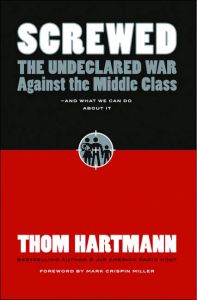Join getAbstract to access the summary!

Join getAbstract to access the summary!
Thom Hartmann
Screwed
The Undeclared War Against the Middle Class - and What We Can Do About It
Berrett-Koehler, 2006
What's inside?
The American Dream once meant financial security, but those days are over. How did this happen?
Recommendation
Since the early 1980s, American politics have been meshed with the interests of large corporations. The result is a new form of "corporatocracy," which Thom Hartmann links to the woes of the middle class. He believes that the political Conservatives who pushed for privatization and special corporate tax breaks intentionally harmed the American middle class, which he calls the bedrock of democracy. While the U.S. government has helped corporations and wealthy citizens, it has increasingly taxed the public and killed social programs that fostered the middle class. Hartmann focuses on the U.S.' future, which, he says, depends on having a healthy middle class. He adds a historical perspective by quoting America's founders, who predicted the dangers of creeping corporatism, economic elitism and an incipient aristocracy. Although he is very assertive in his attacks on Conservatives and corporations, his approach is refreshing. getAbstract found this impassioned analysis interesting, but – fair warning – you won't like it much if you're a corporate lobbyist or a Bush supporter.
Summary
About the Author
Air America radio talk show host Thom Hartmann has written 14 books, and speaks frequently on culture and communications. He is the former director of a treatment facility for abused children and has set up hospitals, relief programs, schools and communities for orphaned or blind children in Africa, Australia, Europe, India, Israel, Russia, South America and the U.S.



















Comment on this summary